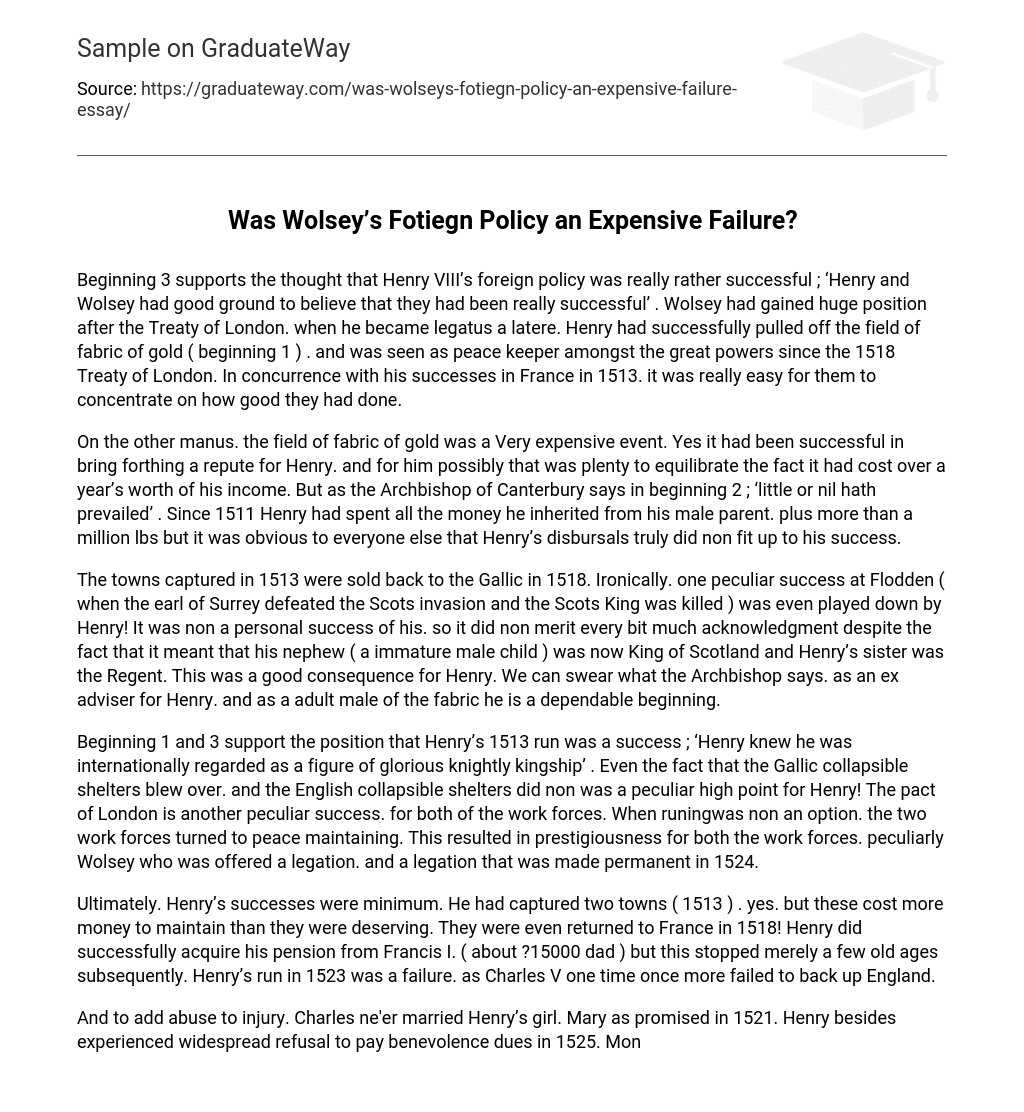Beginning 3 supports the thought that Henry VIII’s foreign policy was really rather successful ; ‘Henry and Wolsey had good ground to believe that they had been really successful’ . Wolsey had gained huge position after the Treaty of London. when he became legatus a latere. Henry had successfully pulled off the field of fabric of gold ( beginning 1 ) . and was seen as peace keeper amongst the great powers since the 1518 Treaty of London. In concurrence with his successes in France in 1513. it was really easy for them to concentrate on how good they had done.
On the other manus. the field of fabric of gold was a Very expensive event. Yes it had been successful in bring forthing a repute for Henry. and for him possibly that was plenty to equilibrate the fact it had cost over a year’s worth of his income. But as the Archbishop of Canterbury says in beginning 2 ; ‘little or nil hath prevailed’ . Since 1511 Henry had spent all the money he inherited from his male parent. plus more than a million lbs but it was obvious to everyone else that Henry’s disbursals truly did non fit up to his success.
The towns captured in 1513 were sold back to the Gallic in 1518. Ironically. one peculiar success at Flodden ( when the earl of Surrey defeated the Scots invasion and the Scots King was killed ) was even played down by Henry! It was non a personal success of his. so it did non merit every bit much acknowledgment despite the fact that it meant that his nephew ( a immature male child ) was now King of Scotland and Henry’s sister was the Regent. This was a good consequence for Henry. We can swear what the Archbishop says. as an ex adviser for Henry. and as a adult male of the fabric he is a dependable beginning.
Beginning 1 and 3 support the position that Henry’s 1513 run was a success ; ‘Henry knew he was internationally regarded as a figure of glorious knightly kingship’ . Even the fact that the Gallic collapsible shelters blew over. and the English collapsible shelters did non was a peculiar high point for Henry! The pact of London is another peculiar success. for both of the work forces. When runingwas non an option. the two work forces turned to peace maintaining. This resulted in prestigiousness for both the work forces. peculiarly Wolsey who was offered a legation. and a legation that was made permanent in 1524.
Ultimately. Henry’s successes were minimum. He had captured two towns ( 1513 ) . yes. but these cost more money to maintain than they were deserving. They were even returned to France in 1518! Henry did successfully acquire his pension from Francis I. ( about ?15000 dad ) but this stopped merely a few old ages subsequently. Henry’s run in 1523 was a failure. as Charles V one time once more failed to back up England.
And to add abuse to injury. Charles ne’er married Henry’s girl. Mary as promised in 1521. Henry besides experienced widespread refusal to pay benevolence dues in 1525. Money was running out. Attempts to achieve an annulment via foreign policy were besides a large failure. The Catholic Pope was under Charles V legal power after 1527. and seeing as Catherine of Aragon was Charles aunt. he wasn’t traveling to let it.
In my sentiment. Henry VIII’s foreign policy was an expensive failure. Although he did see some stray successes. they did non outweigh the failures or the cost. To add farther abuse to Henry’s failure. I think that a batch of the success England experienced in the period was more down to Wolsey than Henry. The field of fabric of gold was down to Wolsey. It was the company between to two that made Henry seem more successful. Henry had non gained power in Europe – neglecting to get married his girl to Emperor Charles V. and non retaining control of any land won in 1513 and he had non succeeded in accomplishing his revocation.





